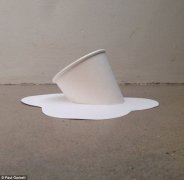Who should listen to whether drinking coffee is "harmful" or "good"?
Coffee is one of the world's three major drinks, although it has not entered the life of Chinese people for many years, but it has attracted many fans. In the face of this exotic, many people are entangled: this expert said it can fight cancer, that expert said it will hurt the stomach, who should I listen to?

Coffee is an extract of coffee beans, of which there are no fewer than hundreds of ingredients, of course, the most core is caffeine. Although there is "decaf coffee," it is not "real" coffee for most coffee lovers. Caffeine is a neurostimulant, and "refreshing" is its basic function, especially caffeine and glucose, which promote each other to make the refreshing effect better.
As a huge industry, people naturally care about: in addition to refreshing, caffeine has no additional "health function"? There is a wealth of research, and some studies show that it may work. For example, drinking a cup of coffee or caffeinated beverage (such as tea) after a meal may reduce dizziness caused by low blood pressure. Older people who drink coffee regularly have a lower incidence of Parkinson's disease. In addition, some studies have found that caffeine may also help reduce gallstones and type 2 diabetes.
In addition to caffeine, coffee also contains many other "active ingredients", such as antioxidants, that may contribute to cardiovascular health. But coffee also contains "harmful substances," such as diterpenes, which increase the risk of cardiovascular disease. This is simply "left and right fight", fortunately diterpenes can be filtered out by coffee paper, so: make coffee remember to use filter paper!
Similar to cardiovascular health effects is "cancer"-three cups of coffee a day may reduce the risk of rectal cancer, according to research; however, coffee beans also produce acrylamide when roasted, and high doses of acrylamide have been shown to be carcinogenic in animal studies.
Coffee's "bad behavior" is not just that. If you drink too much coffee a day (say, more than six cups), it can lead to addiction, decreased sensitivity to coffee, and then drink more. Drinking too much can lead to insomnia, nervousness, stomach upset, nausea, vomiting, increased heart rate and breathing, headaches, tinnitus and other symptoms. Especially for heart disease patients, five cups a day can reach an "unsafe" amount. Moreover, while coffee may reduce the risk of type 2 diabetes, its effects on blood sugar are complex, with some studies showing increases and others showing decreases-apparently confusing the public, but scientists publish only their own observations and don't "negotiate first." Therefore, if diabetics want to drink coffee, they should pay attention to monitoring their blood sugar changes and make timely adjustments. Coffee can also increase calcium loss. If you have osteoporosis, limit your caffeine intake to 300 milligrams per day (equivalent to two or three cups of coffee).
Caffeine can interact with a variety of drugs, some to increase their effectiveness, some to decrease it--either way, it's bad for the treatment. The average person probably can't remember the effect of caffeine on various drugs, so the simplest way to do it is: don't drink coffee while taking various drugs!
As natural extracts are complex in composition, it is not surprising that different ingredients have different effects, and different experiments yield different results. As a beverage, coffee may have exciting "health benefits" or worrying "side effects." Most of these findings are epidemiological, and the conclusions are not conclusive. Combined with these positive and negative studies, the most widely accepted recommendation is that healthy adults drink two or three cups of coffee a day, and the "benefits" outweigh the "risks"; other groups need to be weighed on a case-by-case basis.
Important Notice :
前街咖啡 FrontStreet Coffee has moved to new addredd:
FrontStreet Coffee Address: 315,Donghua East Road,GuangZhou
Tel:020 38364473
- Prev

The photography theme related to the coffee cup is Cuppaday.
According to the Daily Mail, for most of us, the use of coffee cups is very limited, but it is just brewing coffee and so on. But a designer turned his penchant for caffeine into creativity, turning this everyday must-do into a work of art. Paul Garbett, a South African artist who lives in Sydney, uses paintings and trinkets to reshape each cup into
- Next

Coffee canvas Kaohsiung Xiamen Street three-dimensional pull flowers close to the realm of God and Man
Three-dimensional flower drawing is not uncommon, customization is unique! Zhang Guifang, the owner of My cofi in Xiamen Street, Lingya District, Kaohsiung City, has exquisite craftsmanship. He uses coffee as a canvas and uses 3D flowers to create pet images, cartoon dolls or characters. Some netizens describe it as a coffee shop that makes girls scream and children crazy. My cofi customized 3D hand-made coffee carvings, many customers bring
Related
- Can I make coffee a second time in an Italian hand-brewed mocha pot? Why can't coffee be brewed several times like tea leaves?
- Hand-brewed coffee flows with a knife and a tornado. How to brew it? What is the proportion of grinding water and water temperature divided into?
- What is the difference between Indonesian Sumatra Mantinin coffee and gold Mantinin? How to distinguish between real and fake golden Mantelin coffee?
- What does bypass mean in coffee? Why can hand-brewed coffee and water make it better?
- Unexpected! Ruixing Telunsu lattes use a smoothie machine to foam milk?!
- % Arabia's first store in Henan opens into the village?! Netizen: Thought it was P's
- Does an authentic standard mocha coffee recipe use chocolate sauce or powder? Mocha Latte/Dirty Coffee/Salty Mocha Coffee Recipe Share!
- What is the difference between Vietnam egg coffee and Norway egg coffee? Hand-brewed single product coffee filter paper filter cloth filter flat solution!
- What is the difference between sun-cured and honey-treated coffee? What are the differences in the flavor characteristics of sun-honey coffee?
- How to make Italian latte! How much milk does a standard latte use/what should the ratio of coffee to milk be?

